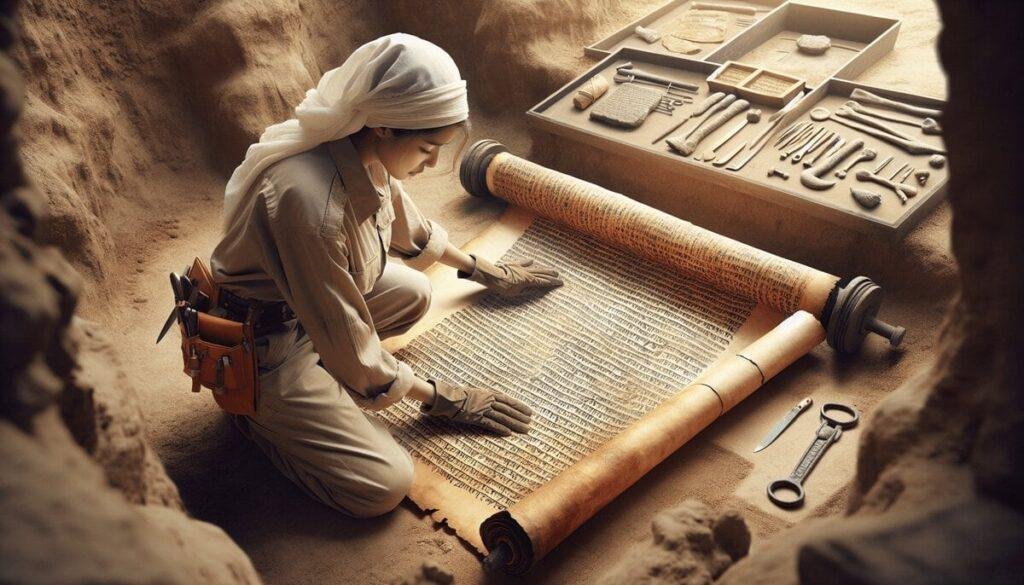Unveiling the Hidden Stories: The Impact of Biblical Archaeology on Modern Society explores the profound influence that Biblical Archaeology has had on our present-day society. By uncovering the ancient remnants of the biblical world, archaeological discoveries have not only shed light on historical events and places mentioned in the Bible but have also vastly enriched our understanding of ancient cultures and civilizations. From uncovering ancient artifacts to confirming the authenticity of biblical narratives, this article highlights the significance of biblical archaeology in shaping our knowledge, beliefs, and perspectives.

The Beginnings of Biblical Archaeology
Archaeology plays a crucial role in unraveling the mysteries of the past, and one particular branch of this field has had a significant impact on modern society – Biblical Archaeology. This discipline focuses on the exploration and excavation of sites mentioned in the Bible, as well as an examination of ancient texts and artifacts that shed light on biblical narratives. The study of Biblical Archaeology has provided valuable insights into the history and culture of the ancient Near East, as well as a better understanding of the origins and development of religious beliefs.
Discovery of ancient biblical texts
One of the major contributions of Biblical Archaeology is the discovery and decipherment of ancient biblical texts. Before the advent of modern archaeological techniques, our understanding of biblical narratives was derived solely from the scriptures themselves. However, in the 19th and 20th centuries, numerous ancient texts were unearthed in archaeological excavations, bringing to light previously unknown stories and accounts. These texts, such as the Dead Sea Scrolls and the Mesha Stele, have provided invaluable historical and cultural context to the events and figures mentioned in the Bible.
Early archaeological explorations in the Holy Land
The exploration of the Holy Land, the region encompassing modern-day Israel, Palestine, and parts of Jordan and Lebanon, has played a crucial role in the development of Biblical Archaeology. In the 19th century, pioneering archaeologists such as Sir William Flinders Petrie and Sir Charles Warren conducted extensive excavations in this region, unearthing ancient cities, temples, and artifacts mentioned in the Bible. These early explorations provided the foundation for subsequent research and sparked widespread interest in the field.
Establishing the Authenticity of Biblical Narratives
One of the primary objectives of Biblical Archaeology is to establish the authenticity of biblical narratives by seeking evidence that correlates with the events and figures described in the Bible. Through meticulous excavation and analysis, archaeologists have uncovered numerous artifacts and structures that provide compelling evidence for the historical accuracy of biblical accounts.
Evidence for biblical events and figures
Archaeological discoveries have provided concrete evidence for various biblical events and figures. For example, the ruins of Jericho, excavated by Kathleen Kenyon and others, have revealed evidence of the city’s destruction, corresponding to the biblical account of Joshua’s conquest. Similarly, the Tel Dan Stele, an ancient inscription discovered in northern Israel, includes references to the “house of David,” supporting the existence of King David as depicted in the Bible.
Correlation between archaeology and biblical accounts
The field of Biblical Archaeology has demonstrated the correlation between archaeological findings and biblical accounts. Objects and structures mentioned in the Bible, such as altars, temples, and religious artifacts, have been found and studied, corroborating the descriptions provided in biblical texts. This correlation not only strengthens the authenticity of the biblical narratives but also provides a deeper appreciation for the historical and cultural contexts in which these events transpired.
Preserving Cultural Heritage through Archaeological Discoveries
Biblical Archaeology not only uncovers ancient artifacts but also plays a crucial role in their preservation, ensuring the safeguarding of our cultural heritage. Archaeologists employ meticulous excavation techniques, emphasizing the preservation of artifacts in their original context, to gain a deeper understanding of the material culture of biblical times.
Finding and preserving ancient artifacts
Through systematic excavation and careful preservation, archaeologists have discovered and preserved a wealth of ancient artifacts. These artifacts, ranging from pottery and jewelry to monumental structures, offer a tangible connection to the past, enabling us to understand the lives and beliefs of the people who lived in biblical times. By meticulously documenting the context and location of each artifact, archaeologists ensure that future generations can continue to study and learn from these invaluable historical treasures.
Understanding the material culture of biblical times
By studying the material culture of biblical times, Biblical Archaeology provides a unique perspective on the daily lives and practices of ancient societies. The artifacts uncovered in excavations illuminate various aspects of life, such as religious rituals, agriculture, trade, and social hierarchy. This deeper understanding of the material culture allows us to appreciate the rich tapestry of ancient civilizations and sheds light on the context in which the biblical narratives were developed.
Contributing to the Field of Ancient History and Biblical Studies
Biblical Archaeology has greatly contributed to our understanding of ancient history and biblical studies. The discipline offers a multidisciplinary approach, combining archaeological excavations, textual analysis, and historical research to reconstruct ancient societies and shed light on the context of biblical texts.
Reconstructing ancient societies and civilizations
Through the examination of archaeological remains and textual evidence, Biblical Archaeology contributes to the reconstruction of ancient societies and civilizations. By piecing together the fragments of the past, archaeologists can reconstruct the social, political, and economic structures of ancient societies, offering valuable insights into the human experience in biblical times. This multidisciplinary approach enables scholars to paint a more accurate and comprehensive picture of the ancient world.
Examining the context of biblical texts
Biblical texts were written in specific historical and cultural contexts, and Biblical Archaeology helps us understand these contexts more fully. By examining the archaeological and historical evidence alongside the biblical texts, scholars can gain a deeper understanding of the religious, social, and political influences that shaped the development of these texts. This contextual analysis allows for more nuanced interpretations of the Bible and provides a holistic view of the complex interplay between history, culture, and religion.

Understanding the Origins and Development of Religion
The study of Biblical Archaeology also sheds light on the origins and development of religious beliefs, offering valuable insights into the ancient religious practices and the evolution of religious thought.
Exploring the religious practices of ancient societies
Biblical Archaeology provides a unique opportunity to explore the religious practices of ancient societies. By examining ancient temples, altars, and religious artifacts, archaeologists can gain insights into the rituals, beliefs, and symbols that formed the foundation of ancient religious systems. These discoveries allow us to better understand the religious worldviews of the biblical peoples and the cultural and social significance of their religious practices.
Tracing the evolution of religious beliefs
The archaeological record also allows for the tracing of the evolution of religious beliefs over time. By comparing the religious artifacts and structures from different periods, archaeologists can observe changes in religious practices, iconography, and the concepts of divinity. This exploration of the development of religious beliefs not only enriches our understanding of ancient societies but also provides valuable insights into the broader human experience of spirituality and faith.
Challenging and Expanding Knowledge of Biblical Literature
Biblical Archaeology has challenged and expanded our knowledge of biblical literature by uncovering lost and forgotten texts and providing new perspectives on biblical interpretation.
Discovering lost and forgotten biblical texts
One of the most exciting contributions of Biblical Archaeology is the discovery of lost and forgotten biblical texts. The Dead Sea Scrolls, for example, include fragments of biblical books, as well as previously unknown religious texts. These discoveries have expanded our understanding of the canon of biblical literature and shed light on the diversity of religious texts circulating during the time of the Bible.
Gaining insights into biblical interpretation
Biblical Archaeology has also provided new insights into the interpretation of biblical texts. By examining the historical and cultural contexts in which the texts were written, archaeologists and biblical scholars can offer fresh perspectives on the meaning and significance of biblical narratives. This interdisciplinary approach challenges traditional interpretations and encourages a more nuanced understanding of the complexities of biblical literature.
Implications for Religious Faith and Spirituality
The discoveries and findings of Biblical Archaeology have profound implications for religious faith and spirituality, both for individuals and religious communities at large.
Strengthening religious beliefs through archaeological findings
For many individuals, archaeological findings that correlate with biblical narratives provide a sense of confirmation and validation for their religious beliefs. The tangible evidence provided by Biblical Archaeology can serve as a powerful affirmation of the authenticity and historical accuracy of the events and figures described in the Bible. These findings can strengthen religious convictions and foster a deeper sense of connection to the sacred texts and traditions.
Debate and discussion over the implications of archaeological discoveries on faith
However, the impact of Biblical Archaeology on religious faith is not without controversy. As new discoveries challenge long-held beliefs or present alternative interpretations, lively debates ensue within religious communities. Scholars and theologians engage in discussions regarding the implications of archaeological discoveries on faith, encouraging a critical examination of religious texts and beliefs. This ongoing dialogue between faith and archaeology fosters intellectual growth, spiritual exploration, and a deeper understanding of the complexities of religious traditions.
Promoting Cultural and Interfaith Understanding
Beyond its impact on religious faith, Biblical Archaeology has the potential to promote cultural understanding and facilitate interfaith dialogue.
Bridging gaps between different religions and cultures
The exploration of biblical sites and the study of ancient texts and artifacts can bridge gaps between different religions and cultures. Shared heritage and historical narratives provide common ground for dialogue and understanding. By fostering a greater appreciation for the rich cultural tapestry of the ancient world, Biblical Archaeology encourages mutual respect and collaboration across religious and cultural boundaries.
Facilitating dialogue and scholarly collaboration
Biblical Archaeology also facilitates scholarly collaboration and exchange of ideas. Scholars from various disciplines, including archaeology, history, theology, and anthropology, come together to study and interpret the findings of excavations and textual analysis. This interdisciplinary dialogue encourages a holistic and nuanced understanding of the biblical world, fostering a spirit of intellectual curiosity and cooperation.
Inspiring Archaeological Tourism and Education
The fascinating discoveries and stories unearthed by Biblical Archaeology have also inspired archaeological tourism and education, allowing people to engage firsthand with the history and cultural heritage of biblical times.
Pilgrimage to biblical sites of significance
Biblical Archaeology has sparked a significant interest in pilgrimage to biblical sites of significance. People from all walks of life travel to the Holy Land, visiting ancient cities such as Jerusalem, Bethlehem, and Nazareth, to experience the tangible connections to the biblical narratives. This pilgrimage not only deepens individuals’ faith but also fosters a sense of awe and wonder at the historical and cultural richness of the region.
Educational programs and curriculum based on biblical archaeology
Furthermore, the impact of Biblical Archaeology extends to formal education. Many educational institutions offer courses and programs that focus on biblical archaeology, providing students with the opportunity to explore the ancient world through a hands-on and multidisciplinary approach. By incorporating archaeological evidence into the curriculum, these programs inspire a love for learning and encourage critical thinking skills. These educational initiatives ensure that future generations will continue to appreciate and contribute to the field of Biblical Archaeology.
Ethical and Legal Considerations in Biblical Archaeology
While Biblical Archaeology yields valuable insights, it is essential to address ethical and legal considerations in the field to ensure the preservation of cultural heritage and navigate cultural and political tensions.
Ensuring ethical excavation and preservation practices
Ethics in Biblical Archaeology dictate the responsible excavation and preservation of ancient sites and artifacts. Archaeologists must adhere to strict guidelines to minimize damage to archaeological sites and to preserve the context and integrity of the findings. By employing meticulous excavation techniques, documenting the findings, and engaging local communities, Biblical Archaeology upholds ethical standards that prioritize the preservation of cultural heritage.
Addressing cultural and political tensions in archaeological work
Biblical Archaeology is often conducted in regions with complex cultural and political tensions. Archaeologists must navigate these challenges sensitively, respecting the rights and interests of local communities. Collaboration with local experts, community engagement, and adherence to relevant legal frameworks contribute to establishing fruitful relationships with local communities and ensure that archaeological work is conducted in a manner that respects cultural sensitivities and fosters mutual understanding.
In conclusion, the field of Biblical Archaeology has had a transformative impact on modern society. From uncovering ancient texts and artifacts to establishing the authenticity of biblical narratives, it has deepened our understanding of ancient history, religious beliefs, and cultural heritage. Additionally, it has contributed to religious faith and spirituality, promoted cultural understanding, and inspired archaeological tourism and education. While navigating ethical and legal considerations, Biblical Archaeology continues to fascinate and captivate individuals with its insights into the hidden stories of the past and its relevance for our present-day world.





